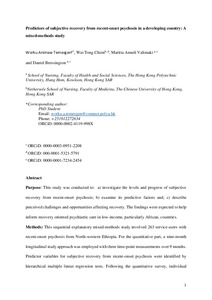Predictors of subjective recovery from recent-onset psychosis in a developing country: a mixed-methods study
Bressington D; Chien WT; Välimäki MA; Temesgen WA
Predictors of subjective recovery from recent-onset psychosis in a developing country: a mixed-methods study
Bressington D
Chien WT
Välimäki MA
Temesgen WA
SPRINGER HEIDELBERG
Julkaisun pysyvä osoite on:
https://urn.fi/URN:NBN:fi-fe2021042823497
https://urn.fi/URN:NBN:fi-fe2021042823497
Tiivistelmä
Purpose This study was conducted to: (a) investigate the levels and progress of subjective recovery from recent-onset psychosis; (b) examine its predictive factors and; (c) describe perceived challenges and opportunities affecting recovery. The findings were expected to help inform recovery-oriented psychiatric care in low-income, particularly African, countries. Methods This sequential explanatory mixed-methods study involved 263 service users with recent-onset psychosis from Northwestern Ethiopia. For the quantitative part, a 9-month longitudinal study approach was employed with three time point measurements over 9 months. Predictor variables for subjective recovery from recent-onset psychosis were identified by hierarchical multiple linear regression tests. Following the quantitative survey, individual qualitative interviews were conducted with 19 participants. Interview data were transcribed and thematically analysed. Results High mean subjective recovery scores were recorded throughout the study (Questionnaire about the Process of Recovery score ranging from 44.17 to 44.65). Quality of life, internalized stigma, disability, hopelessness, satisfaction with social support, and central obesity were significant predictors of subjective recovery across the three time points. Participants' perceived challenges and opportunities affecting their recovery were categorized into four themes. Conclusion In Ethiopia, a low percentage of individuals with SMIs initiate psychiatric treatment and many discontinue this to attend spiritual healing. In this study, the Ethiopian SMI patients engaged consistently in psychiatric treatment indicated high mean subjective recovery scores. Devising mechanisms to integrate the psychiatric treatment and spiritual healing sectors are suggested. Approaches to improve quality of life, functioning, hope, internalized stigma and provide need-based social support are suggested.
Kokoelmat
- Rinnakkaistallenteet [19248]
